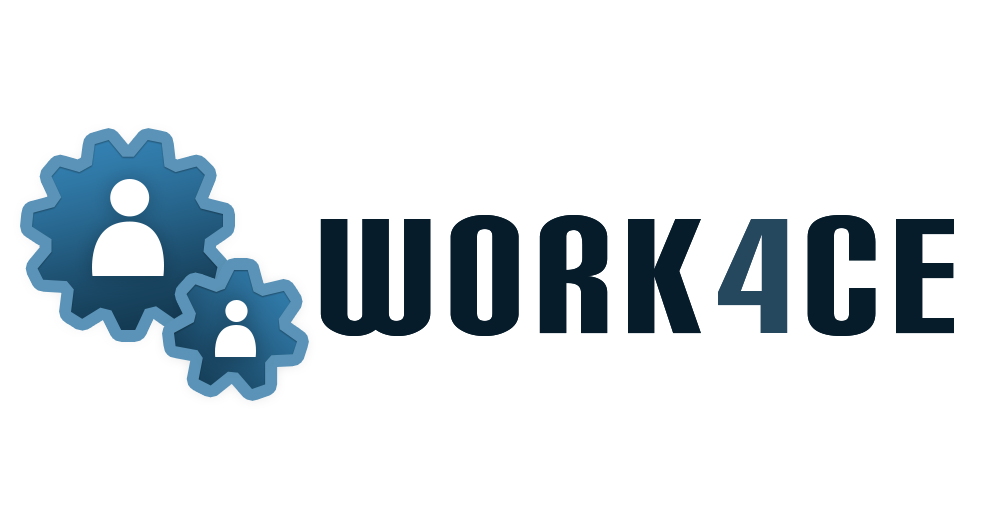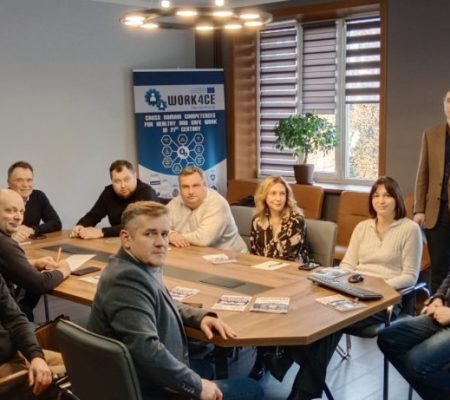WORK4CE Pilot Teaching in KU Leuven
Summary
Welcome to the hybrid pilot teaching within the within the framework of the Erasmus+ CBHE project Cross-domain competences for healthy and safe work in the 21st century 619034-EPP-1-2020-1-UA-EPPKA2-CBHE-JP [WORK4CE]. The Work4ce Pilot Teaching was held in parallel with the Euclides 2024: (Personal) Energy Efficient Mobility in the Future. This event, which brought together around 90 students of various nationalities with engineering backgrounds from several universities, was an important step towards innovative education and sustainable mobility ideas for the future. For the Pilot Teaching, several presentations were given by some of Work4ce’s partners.
Each of them brought a unique perspective on the topic under discussion:
- Carsten Wolff (FHDo) delved into the interdependencies between smart city, smart mobility and smart energy, offering a holistic view of our urban future.
- Galyna Tabunshchyk (NUZP) explored the potential of digital twins to improve the efficiency of electric vehicles, highlighting cutting-edge technology in automotive developments.
- Olena Verenych (KNUCA) led a brainstorming workshop that triggered creativity and innovation among participants.
- Kanan Hasanov (AzUAC) spoke about Digital Ecosystems for Sustainable Mobility of the Future, emphasising the role of technology in green transport solutions.
- Carolina Cruz (UPV/EHU) presented the Sustainability Canvas: Visualizing Personal Mobility’s Impact, a tool to understand and visualise the impact on sustainability.
- Maider Iturrondobeitia (UPV/EHU) analysed Life Cycle Assessment and Transport Systems, underlining the importance of assessing environmental impacts throughout the life cycle of transport systems.
- Jon Aretxaga (UPV/EHU) examined the Economic Impact of mobility alternatives, offering an insight into the financial implications of sustainable transport solutions.
A highlight of this event was the presentation of Board Games created by the students. These Board Games, made with different materials, showed the great creativity and talent of the participants, serving also as a tangible integration of the concepts addressed throughout the lectures. These games enabled the students to conceptualise and visualise the complexity of the interaction between smart cities, sustainable mobility and energy efficiency.
Anticipated Learning Outcomes
Data Analytics and Insights:
Apply data analytics techniques to gather insights into work patterns, preferences, and collaboration needs of distributed teams. Interpret data analysis results to make informed decisions in mobility in the future.
Proficiency in Embedded Systems:
Define embedded systems and understand their applications in enhancing communication, collaboration, and productivity among distributed teams. Incorporate embedded technologies to support virtual communication, shared workspaces, and collaborative tools.
Effective Management of Distributed Teams:
Develop strategies for effective communication, teamwork, and engagement within distributed teams. Identify and address challenges related to cultural differences, time zones, and virtual collaboration.
Change Management Competence:
Develop a change management plan that addresses cultural and organizational shifts required for efficient future mobility. Communicate strategies for managing digital change, engaging stakeholders, and supporting team members through transitions.
Sustainability and Environmental Awareness:
Apply life cycle thinking principles to efficient future mobility, considering sustainability, resource efficiency, and waste reduction. Describe the concept of the circular economy and its relevance to efficient future mobility.
Collaboration and Digital Ecosystems:
Propose strategies for building digital business ecosystems that enhance collaboration and knowledge sharing among distributed teams. Identify digital tools and platforms that facilitate seamless communication and collaboration within the ecosystem.
Creative Problem-Solving and Innovation:
Demonstrate creative thinking in proposing solutions for fostering collaboration, engagement, and productivity.
Effective Communication and Presentation:
Present the efficient future mobility concept, visual representations, and key features in a clear and compelling manner. Engage in a Q&A session to address questions and concerns related to efficient future mobility.
Contact
Galyna Tabunshchyk galina.tabunshchik@gmail.com
News & Events
- |
- News
As part of pilot training under the Erasmus+ KA2: Capacity Building in Higher Education “Cross-domain
Funded by

Agenda
Online Phase of the Pilot Teaching
Assignment upfront of the block week:
- literature reading (Factfulness (H. Rosling))
- Belbin role test (to assign teams)
- collect personal energy data (how much energy you use for heating, electricity, transport at home, numbers and characteristics (e.g. type of heating, nominal power, invoices for gas and electricity)
8:45 – 9:15
Registration of the students and staff
9:15 – 10:45
Welcome (Peter Arras)
Introduction, Group selection and group dynamics (Mieke Cannaerts)
Assignment
K104
10:45 – 12:15
Seminar: Chris Tampere (LIM Leuven Institute of Mobility, KU Leuven)
K104
12:15 – 13:15
Lunch
13:15 – 14:45
Group assignment + work
Workshop: Brainstorm in the group on the assignment
(Olen Verenych, KNUBA)
K005
14:45 – 16:45
Workshop: Mobility meets boardgaming.
(Michiel Van Praet)
K005
17:00
Social event: Belgian fries at campus
Board game evening (inspirational)
K005
09:15 – 10:45
Seminar:
Galina Tabunshchyk (NUZP)
K104
09:15 – 10:45
Seminar:
Carolina Cruz (UPM/EHU)
A017
10:45 – 12:15
Seminar:
Jeroen Vanfraechem (Entras)
K104
10:45 – 12:15
Seminar:
Umicore
A017
12:15 – 13:15
Lunch All
13:15 – 16:00
Daily scrum*
Group work
K005
16:00
Company visit Lantis/Oosterweelverbinding
09:15 – 10:45
Seminar:
Kanan Hasanov
(AzUAC)
K104
10:45 – 12:15
Workshop: Pitching in groups.
(Marc Van Aken, Lynn Vanden Broeck)
K104
12:15 – 13:15
Lunch All
13:15 – 16:45
Daily scrum*
Group work
K005
19:30
Social event: international campus in collaboration with student associations
09:15 – 10:45
Seminar:
Jorge Sousa (ISEL)
K104
Seminar:
Jon Aretxaga (UPM/EHU)
A017
10:45 – 12:15
Seminar:
Carsten Wolff (FH Dortmund)
K104
Seminar:
LCA Maider Iturrondobeitia Ellacuria (UPM/EHU)
A017
12:15 – 13:15
Lunch
13:15 – 16:45
Daily scrum*
Group work
K005
09:15 – 10:45
Group work: Preparing the pitch
(Lynn Vanden Broeck)
K005
12:15 – 13:15
Lunch
13:15 – 14:45
Pitching by groups (15*4min + feedback)
K104
Lectures information
Jon ARETXAGA, UPV/EHU
Peter ARRAS, KU Leuven
Dr ing. Peter Arras, Prof h.c. is senior lecturer at KU Leuven in the faculty of engineering technology. He teaches in bachelor and master degree courses in design methodology, strength of materials and numerical methods for design (FEA, CAE). He obtained a Phd in material sciences teaching in UKF (University Constantine the philosopher, Nitra , Slovacia). He is program director for the degree studies in electro-mechanical engineering. Peter Arras is in charge of international relations for the department of engineering technology at campus De Nayer. He is member of the faculty expert board on international relations. · 10+ years’ professional project management experience as project manager and contact for educational European projects (tempus, KA2, Erasmus mundus, KA1). · 14 years of being coordinator for retraining programs for longtime unemployed. · 40+ peer-reviewed scientific publications: http://lirias.kuleuven.be/cv?Username=U0069202
Carolina CRUZ- VILLAZON, UPV/EHU
Kanan HASANOV, AzUAC
Galyna TABUNSHCHYK NUZP
Olena VERENYCH KNUCA
Professor, Doctor of Engineering Sciences of Project Management Department of Kyiv National University of Construction and Architecture, Kyiv, Ukraine. Reviewer of scientific articles and an active participant in international scientific-practical conferences. The supervisor of bachelor’s and master’s theses at Kyiv National University of Construction and Architecture (KNUCA) and at Dortmund University of Applied Sciences and Arts, Dortmund, Germany (on a voluntary basis), and PhD students. Reviewer of research works submitted for the degree of Doctor of Philosophy; chair and member of ad hoc specialized academic councils; official opponent of research works submitted for the candidate’s degree. Included in the ranking of the best scientific and pedagogical staff of KNUCA. Has experience in implementing Ukrainian and international projects funded by clients, including the European Union, the German Academic Exchange Service (DAAD), and the World Bank for Reconstruction and Development, serving as a project manager. Author of over 100 scientific and methodological works. Holds several copyright certificates for authorship.
Carsten WOLFF Dortmund University of Applied Sciences and Arts/ Fachhochschule Dortmund Institute for the Digital Transformation of Application and Living Domains (IDiAL)
Carsten Wolff is Professor for Computer Science at Dortmund University of Applied Sciences and Arts (FH Dortmund) since 2007. He studied electrical engineering and economics at Paderborn University and did a PhD in information technology at the Heinz Nixdorf Institute. In his industrial career, Dr. Wolff was in the semiconductor industry (Infineon AG), working in Germany, P.R. China, and Taiwan. He worked as project manager, head of department, and program manager on the development of ASICs and processors. He also contributed to the development of a new research centre in P.R. China. At FH Dortmund, he is the spokesman of the DAAD strategic partnership „EuroPIM – European Partnership for Project and Innovation Management”, co-founder of the Master’s Embedded Systems for Mechatronics and Master Digital Transformation. From 2011-2015 he was the vice-rector for study, teaching, and international relations. From 2019-2021 he was the provost and vice-rector of the newly founded Astana IT University (AITU) in Kazakhstan. From 2015-2018 he was the spokesman of the industry-university cluster ruhrvalley. Carsten Wolff is a founding member and director of the “Institute for the Digital Transformation of Application and Living Domains (IDiAL)”. He was the PCC member of a series of Eureka/ITEA projects for FH Dortmund. Carsten Wolff is a co-founder of Smart Mechatronics GmbH and CP contech electronic GmbH.
Lectures and E-Learning Content
M01. Data Analytics for Work
M02. Digital Technologies
M03. Industry 4.0
- Consider strategies to incorporate Industry 4.0 technologies when getting connected.
- Reflect on how Industry 4.0 comes into view in the case study.
- Suggest technologies like IOT, Digital twins for integration in the workspace design. (How to capture data, how to use data (e.g. environmental data), simulation of office capacity, time zones in distributed teams…)
- Consider a practice for digital and physical rapid prototyping for understanding of products at different locations (additive manufacturing).
M04. Distributed Teams
M05 Work 4.0
M06 Safe Workplaces
M07. Managing Digital Change
- Digital strategy and vision:
- Leadership and Stakeholders engagement:
- Change Management and Communication:
- Digital skills and training:
- Data and Security Governance:
- Technology Infrastructure and Integration:
- User Experience and Customer-Centricity:
- Agile and Iterative Approach:
- Risk Management and Contingency Planning:
- Measuring and Monitoring Perf
- Collaboration and Partnerships:
M08. Life Cycle Thinking and Sustainable Management
M09. Developing Digital Business Ecosystems
- Explore opportunities for collaboration and knowledge sharing among distributed teams.
- Propose strategies for building a digital business ecosystem within the market research company, fostering collaboration both internally and externally.
- Digital Platforms and Tools: Identify digital platforms and tools that can facilitate collaboration and knowledge sharing.
- Consider project management software, online collaboration platforms, and data sharing tools to create a connected ecosystem.
- Partner Engagement: Develop strategies to engage external partners and stakeholders within the digital business ecosystem.
- Explore possibilities for joint ventures, strategic alliances, and knowledge exchange to enhance innovation and collaboration.
- Data Privacy and Security: Address data privacy and security concerns within the digital business ecosystem.
- Implement measures such as secure data transfer, encryption, and access controls to protect sensitive information and ensure compliance with regulations.
- Continuous Learning and Development: Promote continuous learning and development within the digital business ecosystem.
- Establish mechanisms for sharing best practices, conducting virtual training sessions, and fostering a culture of innovation and growth


